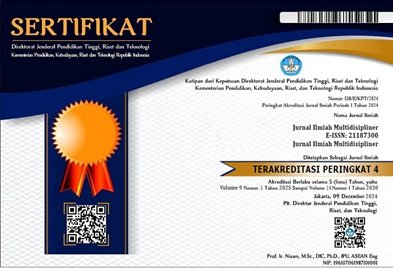TEOLOGI INKLUSIF DALAM GEREJA KONTEMPORER: MENYIKAPI ISU GENDER DAN KESETARAAN DALAM PERSPEKTIF TEOLOGI FEMINIS
Kata Kunci:
Teologi Feminis, Inklusivitas, Kesetaraan Gender, Gereja Kontemporer, Transformasi Teologis, Hermeneutika KritisAbstrak
Tulisan ini mengkaji kontribusi teologi feminis dalam membentuk paradigma gereja yang inklusif dan setara gender di tengah realitas sosial-keagamaan yang masih didominasi oleh struktur patriarkal. Berangkat dari kesadaran bahwa banyak gereja masih mempertahankan sistem dan tafsir teologis yang menyingkirkan perempuan dari posisi strategis, penelitian ini bertujuan untuk menunjukkan bagaimana teologi feminis berperan sebagai alat kritis sekaligus konstruktif dalam mereformasi teologi dan praktik gerejawi. Dengan menggunakan pendekatan kualitatif dan metode hermeneutika kritis, tulisan ini membaca ulang teks-teks Alkitab dan tradisi gereja dari perspektif pengalaman perempuan, serta mengangkat kontribusi para teolog feminis seperti Rosemary Radford Ruether, Elizabeth Schüssler Fiorenza, dan Letty M. Russell. Penelitian ini menemukan bahwa teologi feminis tidak hanya berfokus pada representasi perempuan dalam kepemimpinan gereja, tetapi juga menyentuh aspek yang lebih mendasar, yakni pemaknaan ulang terhadap Allah, manusia, dan struktur kuasa dalam komunitas iman. Teologi feminis menawarkan alternatif pembacaan Kitab Suci yang lebih adil gender, menolak pemahaman literal yang diskriminatif, serta mendorong lahirnya model kepemimpinan yang partisipatif dan inklusif. Selain itu, teologi feminis juga memberikan fondasi bagi pembangunan teologi inklusif yang menempatkan setiap individu—tanpa memandang jenis kelamin, ras, atau latar belakang sosial—sebagai bagian yang setara dalam tubuh Kristus. Implikasi dari pendekatan ini meliputi reformasi dalam pendidikan teologi, rekonstruksi bahasa liturgis yang bebas dari bias gender, serta penciptaan komunitas gereja yang benar-benar menjadi ruang aman bagi semua orang, termasuk perempuan dan kelompok marjinal. Teologi feminis mendorong gereja untuk kembali kepada inti Injil—kasih, keadilan, dan pembebasan—sehingga tidak sekadar menjadi pewarta kebenaran dari mimbar, tetapi juga agen transformasi sosial yang nyata. Dengan demikian, teologi feminis bukanlah ancaman terhadap iman Kristen, melainkan suatu panggilan profetik untuk membebaskan gereja dari eksklusivisme dan meneguhkan kembali martabat setiap pribadi sebagai imago Dei. Penelitian ini mengajak gereja kontemporer untuk terus melakukan refleksi kritis dan transformasi praksis dalam mewujudkan gereja yang adil gender dan benar-benar mencerminkan kasih Kristus bagi semua orang.
This article examines the contribution of feminist theology in shaping an inclusive and gender-equitable church paradigm amid socio-religious realities still dominated by patriarchal structures. Recognizing that many churches continue to uphold theological systems and interpretations that marginalize women from strategic roles, this study seeks to demonstrate how feminist theology functions both as a critical and constructive tool in reforming ecclesial theology and practice. Utilizing a qualitative approach and critical hermeneutical method, this paper reinterprets biblical texts and church traditions through the lens of women's experiences, highlighting the contributions of feminist theologians such as Rosemary Radford Ruether, Elisabeth Schüssler Fiorenza, and Letty M. Russell. The study finds that feminist theology does not merely advocate for female representation in church leadership, but addresses more fundamental dimensions—namely the redefinition of God, humanity, and power structures within the faith community. Feminist theology offers alternative, gender-just readings of Scripture, rejects literalist and discriminatory interpretations, and promotes participatory and inclusive models of leadership. Moreover, feminist theology provides a foundation for building an inclusive theology that recognizes each individual—regardless of gender, race, or social background—as an equal member of the body of Christ. The implications of this approach include reforms in theological education, reconstruction of gender-neutral liturgical language, and the creation of church communities that truly serve as safe spaces for all people, including women and marginalized groups. Feminist theology urges the church to return to the core of the Gospel—love, justice, and liberation—so that it becomes not only a preacher of truth from the pulpit but also a real agent of social transformation. Therefore, feminist theology is not a threat to Christian faith, but a prophetic call to liberate the church from exclusivism and reaffirm the dignity of every person as the imago Dei. This study invites the contemporary church to continually engage in critical reflection and practical transformation toward becoming a gender-just and Christ-reflective community for all.





